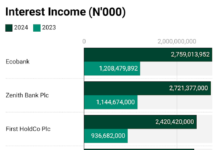James Emejo writes on the need to preserve the autonomy of the Central Bank of Nigeria in the interest of the nation’s economy
The National Assembly recently passed a bill seeking to amend the CBN Act, 2007 (as amended) to reduce some of the powers of the apex bank to take far-reaching decisions on its core mandate without recourse to the fiscal authority or other external stakeholders.
The parliament had also scheduled a public hearing of the bill as required by law to satisfy all procedures before final amendments and possible transmission to President Bola TInubu for his assent.
However, the controversies and pushback that have greeted this development have forced the lawmakers to suspend further works on the proposed amendment to the CBN Act.
Only recently, Special Adviser to the Chairman, Senate Committee on Banking, Insurance and Other Financial Institutions, Prof. Uche Uwaleke, in a statement said the National Assembly had put the entire amendment process of the CBN Act on hold to allow for more consultations amid reports that the legislature planned to transfer interest rate decisions from the CBN to a committee to be chaired by the Minister of Finance, a claim which he denied.
No doubt, recent events may have informed the decision to introduce several changes to the current CBN Act – including the bank’s alleged reckless exposure to the federal government and other advances deemed to have breached set thresholds as well as most recent attempts by top officials of the bank to venture into politics while still holding on to their positions in the bank, among other alleged infractions.
But analysts have argued that while certain aspects of the CBN Act may be tweaked to bring some level of sanity to the bank, especially the incursion of its officials into politics while they remain staff of the apex banking regulatory institution, it is still in the overall interest of the economy to preserve the autonomy of the central bank.
Several schools of thought have continued to defend the notion that the central bank’s independence remained sacrosanct and non-negotiable for any reason.
The bill, sponsored by Senator Sunday Karimi, seeks to make the “Central Bank more transparent and accountable in its operations and to ensure enhancement of its functions and or connected matters herewith.”
The proposed legislation attempts to alter the current board composition of the apex bank by introducing diverse stakeholders from the economy including the fiscal side into the board.
Specifically, “The Board shall consist of a) A Governor who shall be the Chairman; (b) four Deputy Governors; (c) five Directors; (d) the Permanent Secretary Federal Ministry of Finance; (e) the Accountant General of the Federation; (f) the Auditor General of the Federation;’ (g) the Chairman, Federal Inland Revenue (FIRS); (h) the Managing Director/Chief Executive of Nigeria Deposit Insurance Corporation (NDIC); (i) the President, Chartered Institute of Bankers of Nigeria.”
Also, Section 9 of the Principal Act was amended by including a new subsection 2 and retaining the existing section as Sub-section 1.
The proposed amendment reads: “9(1) The Governor and Deputy Governors shall devote the whole of their time to the service of the bank and while holding office shall not engage in any full-time or part-time employment or vocation whether remunerated or not except such personal or charitable causes as may be determined by the board and which do not conflict with or detract from their full-time duties provided that the Governor or any of the deputy governors may, by his office, be appointed with the approval of the Board to- “(a) act as member of any Constitution established by the federal government to enquire into any matter affecting currency or Banking in Nigeria;
“(b) become Governor, Director or member of the Board or by whatever name called, of any international bank or International Monetary Institution to which the Federal Government shall have interest or give support or approval; “(c) become Director of any corporation in Nigeria under section 31 of this Act in which the Bank may participate.
“9(2) Notwithstanding the Provisions of this Act or any written law in existence, the Governor and the Deputy Governor of the Bank shall not participate directly or indirectly in partisan politics, nor contest any election, during their tenure in office.”
Other salient aspects of the bill included Section 14(6) of the Principal Act which reads: “14(6) the salaries, fees, wages or other remuneration payable to or in respect of employees of the Bank, other than the Governor or Deputy Governors, shall be as stipulated from time to time by the Board in consultation with the National Salaries, Income and Wages Commission”.
CBN’s position on the bill
The CBN in its submission to the committee noted that while some of the proposed amendments to the CBN Act are commendable as they are designed to entrench the culture of compliance, strengthen corporate governance, and reposition the bank for improved performance in attaining its mandate, having an independent central bank remained the accepted practice across all major world economies.
The apex bank argued that eroding the powers of the CBN will put the government (and legislature) in a bad light and not in tune with global economic trends.
The CBN stated that some of the major proposed amendments to the Act appear to erode the bank’s autonomy and weaken the independence of monetary policy, at variance with international best practices.
For instance, the CBN pointed out that the proposed Coordinating Committee for Monetary and Fiscal Policies concerning monetary policy will undermine the bank’s independence in achieving its price stability mandate.
Specifically, the apex bank contended that the Fiscal and Monetary Policy Coordination in the CBN Act could undermine the CBN’s operational independence and weaken the bank’s flexibility in deploying appropriate policy frameworks in a dynamic economic environment to achieve its mandate.
The bank argued that the proposed amendment would promote undue political interference in purely economic matters, as the fiscal authority would dominate the proposed committee’s membership and chairmanship.
The CBN stressed that “Subjecting the CBN’s budget to National Assembly approval undermines its institutional autonomy and introduces the potential for political interference in monetary policy.
“This could lead to significant delays in monetary policy implementation and hinder swift monetary policy responses with potential negative implications for macroeconomic stability.
“Some of the proposed amendments threaten the independence and operational autonomy of the Bank as the country’s Monetary Authority.”
Global Consensus for Central Bank’s Autonomy
Experts believe that central bank’s independence remains non-negotiable because it is crucial for maintaining economic stability and promoting sustainable growth. And there are several reasons why the bank’s independence is so crucial to the economy.
This is particularly so because central banks are staffed with experts in monetary policy who can make informed decisions to control inflation. Political leaders, on the other hand, may lack the necessary expertise.
Furthermore, independence enhances the credibility of a central bank’s commitment to maintaining low and stable inflation as this trust can lead to lower inflation expectations and, consequently, lower actual inflation.
Also, independent central banks can focus on long-term economic goals rather than short-term political gains. This helps to prevent inflationary policies that might be popular in the short term but harmful in the long term.
In addition, investors and financial markets place higher confidence in monetary policy when it is free from political interference, leading to more stable financial markets and lower risk premiums.
Experts also believe that politicians may be tempted to manipulate monetary policy to create short-term economic booms to win elections, even if such actions are unsustainable and harmful in the long term.
It is also believed that when central banks are independent, they are less likely to finance government deficits through money creation, which can lead to hyperinflation. This enforces fiscal discipline on the government.
Independent central banks can implement countercyclical policies (e.g., raising interest rates during booms and lowering them during busts) without political pressure, leading to more stable economic growth.
Moreover, independent central banks can help prevent economic bubbles and financial crises by focusing on maintaining price stability and monitoring financial systems.
Additionally, the CBN said the inclusion of the Coordinating Committee for Monetary and Fiscal Policies in determining the rates of interest on the bank’s temporary advances to the federal government will not only erode the bank’s operational autonomy but also breed conflict of interest since the committee is chaired by the minister and dominated by fiscal actors.”
Analysts’ perspectives
However, analysts who spoke with THISDAY on the controversial CBN Act amendment, agreed on the need to safeguard the independence of the apex bank.
Managing Director/Chief Executive, Dignity Finance and Investment Limited, Dr. Chijioke Ekechukwu, said: “All over the world, central banks are established to be autonomous and not to be trapped in the activities of the government. In Nigeria, the nature of oversight of CBN on all financial institutions, monetary policy decisions, and banker to the federal government are such that no arm of government should meddle with”.
Ekechukwu added: “CBN has Monetary Policy Committee (MPC) and board members are very qualified and committed persons enough to handle the oversight and corporate governance of the CBN.
“The CBN, therefore, should not be made to submit their budget or bi-annual report to the National Assembly. Such reports are not necessary as the MPC reels out the communique, which covers all monetary policy issues every quarter.
“Please, as a nation, we must avoid meddling with the activities of CBN, so we can hold them completely accountable and responsible for all decisions they take. Meddling with their autonomy will amount to corrupting our financial system stability.”
On his part, Managing Director/Chief Executive, SD&D Capital Management Limited, Mr. Idakolo Gbolade, stressed that the core mandate of central banks across the world includes fixing interest rates for their economy which is sacrosanct.
He said: “However, the Ministry of Finance can align fiscal policies with the monetary policies driven by the CBN to strengthen the economy.
“The power to fix interest rates and drive monetary policies is the symbol of independence of the CBN and without which the relevance of the central bank will be completely eroded.
“I want to believe that the Senate or the National Assembly will not want to tamper with the independence of the CBN to carry out its core functions.”
Idakolo added: “Any attempt to tamper with the independence of the CBN will have serious consequences on the investment drive of the federal government and can cause investors both local and foreign to develop cold feet in investing in Nigeria.”





















